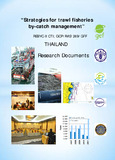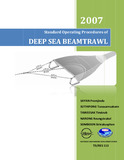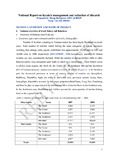| dc.contributor.author | Phoonsawat, Ratanawalee | |
| dc.contributor.author | Auksonphaob, Udomsin | |
| dc.contributor.author | Cheuamankong, Thitipon | |
| dc.contributor.author | Panjarat, Sampan | |
| dc.date.accessioned | 2021-06-24T02:12:30Z | |
| dc.date.available | 2021-06-24T02:12:30Z | |
| dc.date.issued | 2016-09 | |
| dc.identifier.citation | Phoonsawat, R., Auksonphaob, U., Cheuamankong, T., & Panjarat, S. (2016). Gulf of Thailand Trawl Experiments Using 4.0 cm Codend Mesh. Training Department, Southeast Asian Fisheries Development Center. | en |
| dc.identifier.uri | http://hdl.handle.net/20.500.12067/1709 | |
| dc.description.abstract | In responce to the depletion of fisheries resources in the Gulf of Thailand, the DOF Thailand, in collaboration with the Food and Agriculture Organization of the United Nations (FAO) and Southeast Asian Fishery Development Center (SEAFDEC) implemented participatory research into the use of increased (4.0 cm mesh size) trawl codend mesh sizes in Chumporn province, Thailand. The study resulted in four sets of analyses: 1) Catch rate, catch composition and escapement rate between current codend mesh size (1.25 – 1.8 cm stretched full mesh lenght) and esperimental 4.0 cm codend; 2) Comparison analysis of revenue from trawling with the current mesh size and 4.0 cm codend; 3) The assessment of overall financial loss, financial gain and impacts of changing the codend mesh size from the current to 4.0 cm; and 4) Length at first capture of fish from the enlarged mesh size. For Pair trawls, comparing catch rates (catch per unit of effort,CPUE) of 1.8 and 4.0 cm codend mesh size, catches of trash fish reduced from 1,053.8 kg/haul (1.8 cm) to 300 kg/haul (4.0 cm) (Table 3). Catches of economically important species increased from 501.5 kg/haul (1.8 cm) to 525.2 (4.0 cm) kg/haul. Overall income was found to be higher For Otter board trawls, comparing catch rate (CPUE) of 1.25 cm and 4.0 cm codend mesh size,there was a reduced catch rate (76 kg/haul) with the larger mesh size. In particular, there was a significant reduction of the trash fish catch rate from 64.7 kg /haul to 16.7 kg. Catches of demeral and pelagic fish increased but catch of squid and shrimp remained constant. There was a remarkable increase of shellfish, from 0.3 kg/haul in 1.25 cm codend to 16.6 kg/haul in the codend with mesh size of 4.0 cm. Revenue from shellfish was able to offset lost income from trash fish and others. Comparisons with an earlier DoF Study on catch rate and species composition of research vessel (Promong 1) during 2010-2013 showed that catches by the fisheries research vessel were not significantly different to catches from local otter board trawls, 158.5 kg/haul. However, escapement rates from the 4.0 cm codend, calculated as 47 % were higher, possibly because of the shorter towing time (1 hour), used in the experiment. The study suggests potential positive benefits by releasing juveniles of economic species through a larger codend mesh size. The study showed that no matter what composition and size of catch, the escape rate of juvelines increases when the mesh size is increased. However, the study suggests that changing codend mesh size would not alone allow for a significant replenishment of the fisheries resources, even if mesh size was increased to 4.0 cm. The reduced catch of juveniles and small sized trash fish would not dramatically impact fisher’s income. In addition, there would be positive impacts including reduced catch sorting time, increased catch quality and higher price of catch, reduced crew costs due to the decrease in the amount of sorting of catch onboard. By using increased mesh it is possible also to reduce the costs of ice and reduce the fuel use, which are major costs for trawl operators. However considering the decrease in catches, many trawl fishers do not seem to be willing to modify codend mesh size to 4.0 cm. | en |
| dc.format.extent | 115 pages | en |
| dc.language.iso | en | en |
| dc.publisher | Training Department, Southeast Asian Fisheries Development Center | en |
| dc.subject | Trawl Fisheries | en |
| dc.subject | Bycatch Management | en |
| dc.subject | Trawl Experiments | en |
| dc.subject | 4.0 cm Codend | en |
| dc.subject | REBYC-II | en |
| dc.subject | Otter board trawls | en |
| dc.subject | Pair trawls | en |
| dc.title | Gulf of Thailand Trawl Experiments Using 4.0 cm Codend Mesh | en |
| dc.type | Technical Report | en |
| dc.contributor.corporateauthor | REBYC-II CTI | en |
| dc.contributor.corporateauthor | Southeast Asian Fisheries Development Center | en |
| dc.contributor.corporateauthor | Department of Fisheries Thailand | en |
| dc.contributor.corporateauthor | FAO | en |
| dc.contributor.corporateauthor | gef | en |




